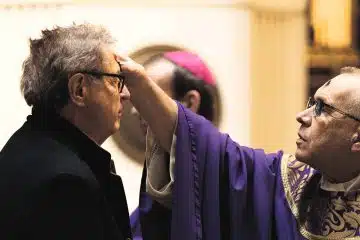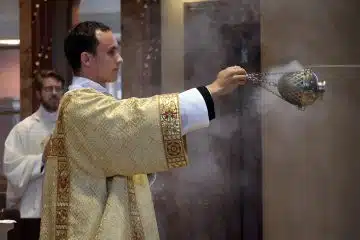Anointing of the Sick and Last Rites
A friend of mine recently received “last rites.” Is there a difference between the anointing of the sick and last rites?
The terms “anointing of the sick” and “last rites” are often used synonymously; however, they are not the same. Last rites, as the name suggests, is a final preparation for death that can include anointing of the sick. Anointing of the sick can be provided apart from last rites to anyone approaching a major surgery or dangerously ill, and to the elderly even if no dangerous illness exists.
The Church’s tradition of anointing and last rites both stem from the Gospel of Mark, where the apostles “anointed with oil many who were sick and cured them” (6:13), and the Letter of St. James, where he writes, “Are there people sick among you? Let them send for the priests of the Church, and let the priests pray over them, anointing them with oil in the name of the Lord” (5:14).
ANOINTING OF THE SICK
The anointing of the sick is a sacrament of healing intended to bring spiritual and physical strength during illness. It can be repeated, especially if someone’s health worsens.
The sacrament is performed by a priest, who uses oil (blessed each year by the bishop during Holy Week) to anoint the person’s forehead and hands. He prays, “Through this holy anointing, may the Lord in his love and mercy help you with the grace of the Holy Spirit. May the Lord who frees you from sin save you and raise you up.”
The sacrament was previously known as “extreme unction”— conveying the serious health situations of those who received it, but it is not intended only for those near death. Often, those who receive anointing recover their health.
LAST RITES
Last rites are administered only to the seriously ill or dying The rites include offering the Eucharist as viaticum (literally, food for the journey) to the sick person. It is administered as a “last Communion” before death. The sacrament of confession, if the ill person is able to confess their sins, is also encouraged. These sacraments help the Christian complete their earthly pilgrimage (Catechism of the Catholic Church, 1525).
Depending on the circumstance, the priest may offer prayers for the dying. Last rites often conclude with the apostolic pardon—a prayer beseeching God to welcome the person to life eternal: “Through the holy mysteries of our redemption, may Almighty God release you from all punishments in this life and in the life to come. May He open to you the gates of paradise and welcome you to everlasting joy.”
CALLING THE PRIEST
In cases of extreme or sudden illness, a priest should be called to administer the sacraments. Contact your local parish, or if in a hospital or hospice, ask a staff member to call a priest. For an after-hours emergency, parishes have a number to call to reach a priest.
If someone dies before receiving the Last Rites, prayers for the dead may be said. The Church commends the person to God’s mercy and prays that they may experience light, happiness and peace.
The Church’s tradition of last rites and the sacrament of anointing of the sick testify to Christ’s desire to be with us in every circumstance. The sacraments that may be received by the sick remind us of God’s goodness, boundless mercy, and His promise to shepherd us from this life to the next.
 Father David Endres is professor of Church history and historical theology at Mount St. Mary’s Seminary & School of Theology.
Father David Endres is professor of Church history and historical theology at Mount St. Mary’s Seminary & School of Theology.
This article appeared in the August 2023 edition of The Catholic Telegraph Magazine. For your complimentary subscription, click here.













